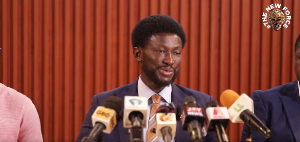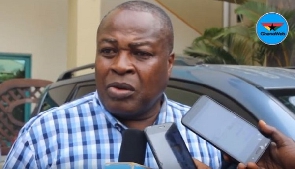Jirapa, (UWR), April 29, GNA - The government since assumption of office has initiated prudent macro-economic policies to resuscitate the economy and restore declining social services, Vice President, Alhaji Aliu Mahama has said.
He said: "ever since the NPP government came to power, substantial financial resources have been provided to improve social infrastructure for the development of the country".
Vice President Mahama said this at a durbar of chiefs and people of the Jirapa Traditional Area to outdoor the former Inspector General of Police, (IGP), Mr. Peter Nanfuri at a colourful ceremony at Jirapa on Saturday.
Mr. Nanfuri, who was enskinned as, Naa Ansoleh Ganaa II, was born on October 12, 1942 at Jirapa in the Upper West Region. He is the fourth paramount chief of the Jirapa Traditional Area and the second former IGP from the North after the Gushiegu Naa, Bawa Andani Yakubu. Alhaji Mahama said with the development of the country, especially the rural communities as the cardinal point of the government, Jirapa Traditional Area has seen substantial improvement with the provision of social infrastructure development.
He said five communities have been provided with a Community Health and Planning Service (CHPS) compound each at a total cost of 1.2 billion cedis, while rural clinics have been constructed at Piina and Tizza Boi. He said a 5.3-billion cedi new Nurses Training College was undergoing construction at Jirapa while a 3.6 billion cedi modern theatre and an administrative block was been provided for the St Joseph Hospital,
Vice President Mahama explained that the government was investing in the health sector to make the people healthy and productive to enable them to reduce poverty among themselves.
He expressed his happiness about the Mutual Health Insurance Scheme in the area, which has registered 50,000 clients out of a population of 107,000, giving it coverage of 47 per cent.
He called on traditional authorities and all other stakeholders in the scheme to work harder to improve on the performance of the scheme by bring everybody to subscribe to it.
On education, he announced that 27-three-unit classroom blocks and 12 teachers quarters have been provided for first cycle schools in the district, while the Jirapa Senior Secondary School is upgraded to a model school.
At the St. Francis Girls Secondary School, a library, a dormitory block and an assembly hall are under construction while the government has provided the Jirapa town with an ICT centre to help make the youth ICT literate to accelerate development.
Alhaji Mahama said the Piina dam would be rehabilitated at a cost of 546 million cedis and the Gori dam would also be rehabilitated with funds from the Community Based Rural Development Project (CBRDP). He said plans were far advanced to desilt existing dams in the district to support poultry, livestock, cashew and other crops production under the Food and Agriculture Budgetary Support and Agricultural Sector Improvement Programme, (AgSIP).
Alhaji Mahama said issues of water and sanitation have been an endemic phenomenon in the rural communities and that the government has provided pipe-borne water for the Jirapa Township under the first phase of the Small Town Water System at a cost of 5.2 billion cedis. The Piina and Ullo communities would also benefit from the facility under the second phase of the small town water system in the region.
He said 199 boreholes have been drilled over the past six years at a cost of 12 billion cedis to help reduce waterborne diseases in the deprived communities in the district.
On the road sector, Alhaji Mahama said, the repair of the Jirapa-Domwini-Hamile road was being considered by the government and that a contract has been awarded for the tarring of the Jirapa-Tizza stretch of the road at a cost of 5.5 billion cedis. He assured the people that the tarring of the road would continue to Hamile to link the western corridor of Burkina Faso and the other Sahelian neighbouring countries with the country's ports in the south to enhance trade in the sub-region.
Tourists attractions, such as the Jirapa Naa and Duori Naa Palaces, the foot prints of the legendary Bayoung on a baobab tree at Ullo, the crocodile pond of Kogri and the mushroom rocks of Wolling would be developed to generate income for the people.
Click to view details



Business News of Sunday, 29 April 2007
Source: GNA
















